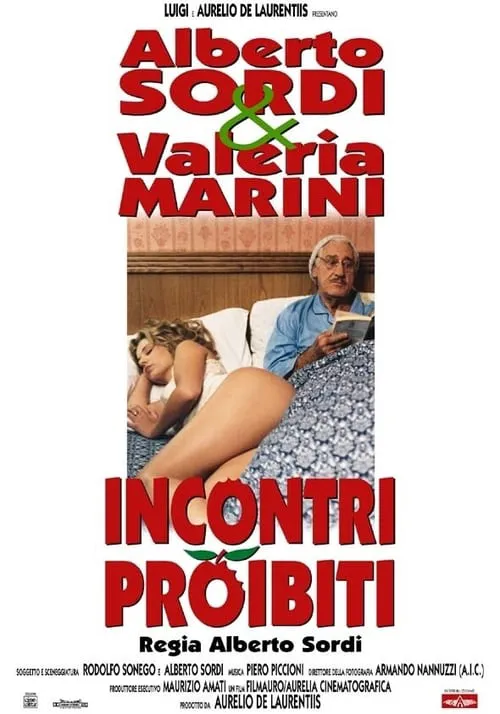Incontri proibiti

Plot
Incontri proibiti, also known as Forbidden Meetings in English, is an Italian erotic drama film directed by Mauro Bolognini, released in 1982. The film revolves around the tumultuous and complex relationship between Armando Andreoli, a retired engineer in his late 70s, and his young nurse, Federica. The story begins with Armando, an elderly widower living alone in his spacious apartment in Rome. As he grows older, Armando becomes increasingly lonely and isolated, longings for human connection and affection. It is during this vulnerable period that he meets Federica, his personal nurse, who takes care of him at home. Federica is a young, beautiful, and charming nurse who is immediately drawn to her elderly patient. As their relationship evolves, she begins to develop feelings for him, and Armando, with his innocence and simplicity, becomes increasingly smitten with his caretaker. Federica, who is still in a relationship, starts to invite Armando to her hotel room during her free time, ostensibly to attend to his needs. However, as their encounters become more frequent, the lines between professionalism and personal relationship become increasingly blurred. While Federica's intentions are genuine, Armando, being the vulnerable and trusting individual that he is, becomes infatuated with his caretaker. Meanwhile, Federica's boyfriend, a young and jealous man, becomes suspicious of her relationship with Armando and begins to snoop around, accusing him of being in a romantic relationship with his partner. As the situation escalates, Federica's boyfriend arrives at the hotel, interrupting one of their meetings. The confrontation that ensues reveals the depth of his possessiveness and jealousy, which ultimately leads to a painful and regretful breakup between the couple. The incident highlights the impossibility of their relationship and the social stigma surrounding the affair. Meanwhile, Armando's innocence and naivety lead him to misinterpret Federica's intentions and assume that their relationship is legitimate and reciprocal. When he eventually discovers that her true relationship is with her boyfriend, he feels betrayed and heartbroken. The film ends with Armando, realizing the futility of their meetings, finally accepting the reality of the situation and letting go of his hope for a romantic connection with Federica. The movie, Incontri proibiti, tackles themes of loneliness, love, and social norms in a poignant and thought-provoking way. Through the complex characters of Armando and Federica, the film sheds light on the difficulties of human connections, the consequences of infidelity, and the societal constraints that shape our relationships. Mauro Bolognini's direction, along with the poignant performances of the cast, adds depth and nuance to the narrative, making it a poignant and thought-provoking film that explores the complexities of the human heart.
Reviews
Axel
The location scouting is good, with the cramped, narrow houses vaguely reminiscent of Chang Tso-chi's "Thanatos, Drunk." However, the themes it tries to address against the backdrop of the pandemic are too fragmented and scattered, leaning more towards emotional expression than forming a coherent and effective narrative.
Samantha
It portrays the ordinary comings and goings of life, birth, aging, sickness, and death, but the protagonist's family story feels too brief and abstract, never quite coming to life.
Jace
Feels like Japanese arthouse cinema, but with a Taiwanese twist.
Bella
The two-hour film has regressed from the non-narrative style of the previous "Summer's Tail" to something resembling a story, albeit a weak one. Even worse, it exploits glove puppetry, leverages the COVID-19 pandemic, and exploits Taiwanese customs and culture. The result is still a disastrous film. It utterly fails to tell a complete character-driven story. Most damningly, the lead actor lacks presence, leading to a bloated and excessively long experience. Using black and white photography as a cost-saving measure? Fine, but it's frankly ugly and does not help the film's feel. Actually the film make people feel worse about the covid-era. Zhang Tso-chi should just retire and stop wasting grants from the Ministry of Culture.
Recommendations




